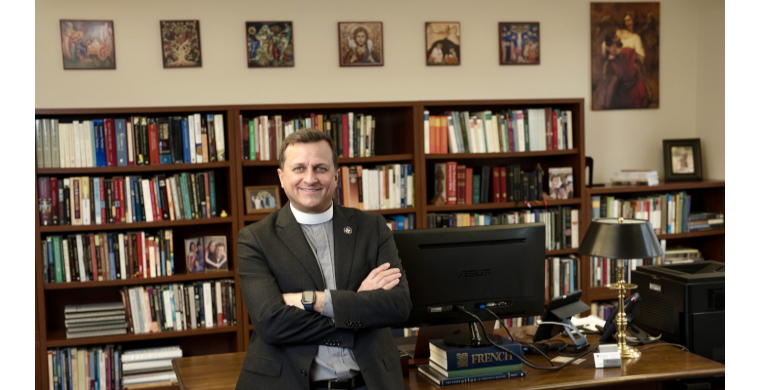Anglican Seminary President Says Next Generation of Graduates can reach a Secular Age
By David W. Virtue, DD
www.virtueonline.org
November 7, 2024
Graduates of Trinity Anglican Seminary can witness for Christ in an increasingly post-Christian culture even when everything around looks bleak and lost.
Writing in the Fall/Winter Seed & Harvest magazine, the Very Rev. C. Bryan C. Hollon, Dean and President, said those serving in the Anglican Church in North America (ACNA) face both unprecedented challenges and unique opportunities in efforts to communicate the gospel.
"At Trinity Anglican Seminary, we are acutely aware of these realities and have positioned ourselves to serve as a cornerstone institution in forming Christian leaders who can effectively witness to Christ in our secular age."
Hollon said the challenges we face are significant and should not be underestimated. Following Christ is becoming more difficult in a culture that has largely abandoned its Christian foundations. We have lost many of the "plausibility structures" that once reinforced and substantiated faith, making belief seem natural and reasonable. These structures, embedded in art, literature, media, advertising, and social norms, have eroded rapidly in recent decades.
"The statistics are sobering. According to the Pew Research Center, the percentage of Americans identifying with no religion at all -- the so-called "nones" -- has grown from a steady 3-7 percent in the early 1970s to approximately 36 percent of the total population today. The shift is even more pronounced among younger generations. While only 17 percent of the Silent Generation identifies as nones, this percentage increases steadily through subsequent generations: 26 percent of Baby Boomers, 35 percent of Gen X, 44 percent of Millennials, and a staggering 48.5 percent of Generation Z. As older generations are replaced by Millennials and Gen Z, we can expect this trend to continue, with profound implications for our culture."
"This demographic shift means that Christian faith is becoming more difficult to maintain and pass on to future generations. Moreover, as our culture turns from Christianity, it does not become neutral but often adopts alternative belief systems and moral outlooks that are actively opposed to Christian teaching. As Aaron Renn observes, we have moved from a "neutral world" to a "negative world" where "Christian morality is expressly repudiated and traditional Christian views are perceived as undermining the social good."
Hollon asks how can we witness to colleagues, friends, family, and neighbors -- perhaps even to those who view our Christian convictions as immoral and would prefer to see us silenced?
Hollon said students who must witness in an increasingly secular context must resist the persecution complex. "We must resist the temptation to overstate our status as a persecuted minority. While we face real challenges, they pale in comparison to the suffering of Christians in other times and places. We are not the first to encounter opposition, and focusing too much on our own mistreatment can cause us to forget that "we do not wrestle against flesh and blood, but against the rulers, against the authorities, against the cosmic powers over the present darkness, against the spiritual forces of evil in the heavenly places" (Eph. 6:12).
Hollon says he and his faculty encourage students to view opposition not as a threat, but as an opportunity to demonstrate the transformative power of the gospel.
Christians can and do flourish even in times of decline, marginalization, and persecution. The early church provides a powerful example of this truth, as do growing churches in hostile environments today. Even in the secularizing West, some churches are holding their own or growing. Those called by Christ seek out communities where they can be encouraged, equipped, and sustained in robust, unwavering biblical orthodoxy, he said.
"We must make the case for Christian faith with unwavering confidence that Jesus Christ is Savior and Lord over all. Our faith is not in our own ability to save the world or to stem the tide of secularization, but in the One who has already conquered sin and death. The book of Revelation, written to encourage Christians living and witnessing in hostile territory, reminds us that Christ has already overcome."
"Looking ahead, we see tremendous opportunities amidst the challenges. As traditional structures erode, there's a growing hunger for the depth of biblical truth in the context of Christ-centered community."
END














